Not sure which shed is right for you? Choosing between a metal vs resin shed can be confusing, especially when both seem to offer great benefits. You might be wondering which one lasts longer, needs less care, or fits your space better.
It's a common problem, but the good news is—you're in the right place. This article will walk you through everything you need to know in a simple and clear way, so you can pick the best shed without second-guessing.
Table of Contents:[hide]
Is a Resin Shed Better than a Metal Shed?
The short answer? It depends on what you need. Both resin (plastic) and metal sheds have their own strong points, and what works best for one person might not be the right choice for another.
Resin sheds are known for being lightweight, low-maintenance, and easy to assemble. They're great if you want something that looks clean and modern without needing a lot of upkeep. Plus, they resist rust, rot, and insects.
On the other hand, metal sheds are typically more durable when it comes to structure. They can handle harsh weather and usually offer more security. However, they may need more care over time, especially in humid or coastal areas where rust can be an issue.
So, is a resin shed better than a metal shed? If you want a quick setup and minimal maintenance, resin might be the way to go. But if you're after strength and long-term durability, a metal shed could be the better choice.
Overview of Resin and Metal Sheds
Here's an overview of resin and metal sheds:
Metal Sheds
Metal sheds are built primarily from galvanized steel, aluminum, or other durable metals. These sheds are known for their exceptional strength and long-lasting nature. Metal sheds offer high resistance to damage from pests, fire, and harsh weather conditions.
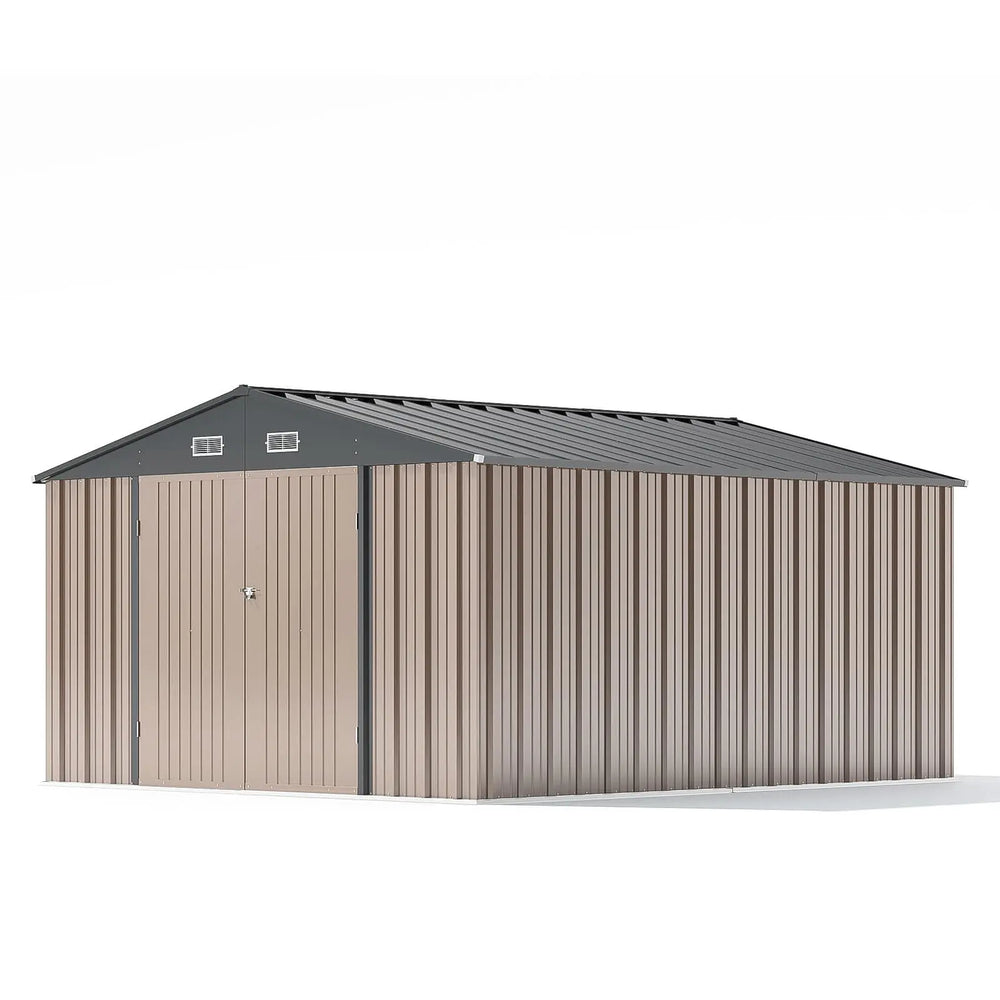
- Provide excellent resistance to rust, corrosion, and weather damage.
- Offers versatile storage solutions for tools, equipment, bikes, and outdoor essentials.
- Requires minimal upkeep compared to wooden alternatives, making it a hassle-free option.
- Sleek and practical design complements any outdoor space or backyard setting.
They are ideal for areas with extreme weather or where security is a concern since they provide a solid structure that is tough to break into.
One downside of metal sheds is that they can be prone to rust if not properly maintained or treated, especially in areas with high humidity or near saltwater. They also tend to absorb heat, which could lead to a hotter interior during the summer months.
While metal sheds generally require less maintenance compared to wooden sheds, they may need occasional touch-ups to prevent rust and maintain their appearance.
Cons of Metal Sheds:
- Prone to rust without proper care
- Can absorb heat in hot weather
- May require more effort for customization (e.g., painting or adding shelves)
Resin (Plastic) Sheds
Resin sheds, also known as plastic sheds, are made from durable, weather-resistant materials like high-density polyethylene (HDPE) or polypropylene. These sheds are incredibly lightweight, making them easy to assemble and move.
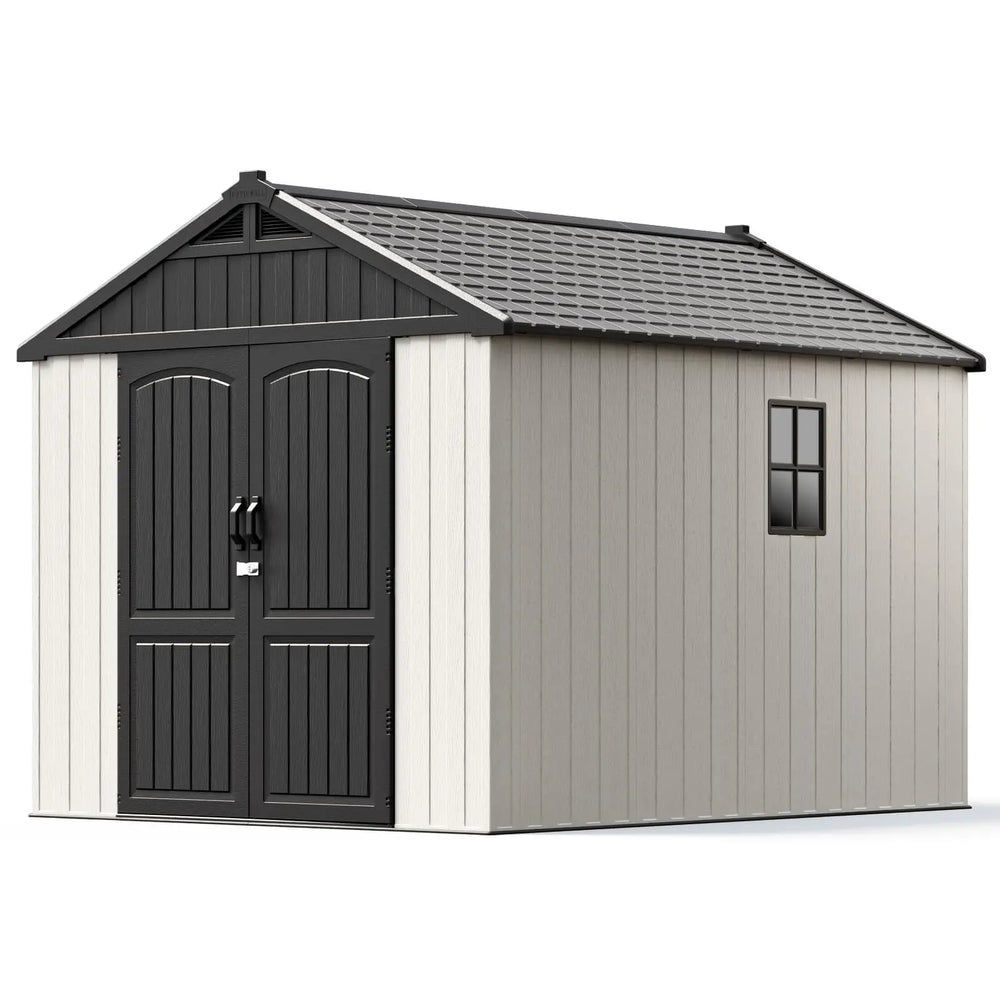
- Made from high-quality resin material that resists rust, rot, peeling, and fading.
- Strong yet easy to move, ensuring convenience without compromising durability.
- No need for painting or treating; simple cleaning keeps the shed looking new.
- Designed to withstand sun exposure without cracking or warping, ensuring long-lasting use.
Resin sheds are also low-maintenance, requiring little to no upkeep beyond occasional cleaning. They don't rust, rot, or get damaged by insects, making them ideal for humid or wet environments.
One of the key advantages of resin sheds is their resistance to fading and cracking from sun exposure. The materials are designed to withstand UV rays, which means they maintain their color and structural integrity for longer.
However, while resin sheds are durable, they don't offer the same level of security as metal sheds and may not be as long-lasting in areas that experience extreme weather or heavy winds.
Cons of Resin Sheds:
- May not offer the same level of security as metal sheds
- Less durable in extremely harsh weather conditions (e.g., heavy snow or strong winds)
- Can be more expensive compared to metal sheds
Comparison Table: Metal vs Resin at a Glance
Here's a detailed comparison to help you choose the right one:
|
Feature |
Metal Shed |
Resin Shed |
|
Cost |
Typically more affordable than resin sheds. Prices vary based on size and material quality. |
Generally more expensive due to the advanced materials used. |
|
Durability |
Very durable, can last 20-30 years with proper care. Susceptible to rust if not maintained. |
Durable, but typically lasts less time than metal sheds. Resistant to rust and rot. |
|
Maintenance |
Requires regular maintenance to prevent rust, especially in humid climates. |
Low-maintenance, just occasional cleaning needed. |
|
Aesthetics |
Can have a more industrial look, which may not blend with all outdoor settings. |
Modern, clean, and versatile look that suits most landscapes. |
|
Weather Resistance |
Performs well in harsh weather but can be prone to rust in wet conditions. |
Excellent in all weather conditions, resistant to fading, rust, and rot. |
|
Ease of Assembly |
Can be more complex to assemble and may require additional tools. |
Very easy to assemble, often requires no tools or minimal assembly. |
|
Customization |
Limited options for customization, usually requires painting or other modifications. |
Offers more flexibility for customization with pre-designed accessories. |
Advantages of Metal Sheds
Metal sheds come with several advantages that make them a popular choice for many homeowners. Here are some of the key benefits:
- Strength and Durability: Metal sheds are incredibly strong, making them ideal for those seeking a secure and long-lasting storage solution. They are perfect for storing tools, equipment, and even valuable items because of their robust structure.
- Fire and Pest Resistance: Unlike wood, metal sheds are resistant to pests like termites and rodents. Additionally, they are fire-resistant, which can be a huge plus in areas prone to wildfires or extreme heat.
- Security: Due to their solid construction, metal sheds are harder to break into compared to plastic or wood sheds, offering better security for your stored items.
- Low Maintenance: While metal sheds may require some rust prevention, they generally need less care than wooden sheds, which can rot and attract insects. With metal sheds, a quick clean-up and occasional touch-up are typically all that's required.
- Weather Resistance: Metal sheds are designed to withstand heavy weather conditions such as rain, snow, and high winds. Their structural integrity remains intact, even in extreme weather.
Advantages of Plastic (Resin) Sheds
Plastic sheds are known for their ease of use and maintenance, offering several advantages over traditional shed materials:
- Low Maintenance: One of the biggest benefits of resin sheds is how little maintenance they require. They don't rust, rot, or get damaged by insects, making them hassle-free and perfect for people who want to avoid frequent upkeep.
- Durable and Weatherproof: Resin sheds are highly resistant to the elements, including rain, snow, and UV rays. They won't fade, crack, or warp due to weather exposure, ensuring they remain looking new for many years.
- Lightweight and Easy to Assemble: Unlike metal sheds, resin sheds are very light, making them easier to move and assemble. Many resin sheds come with a straightforward, tool-free assembly process, saving you time and effort.
- Aesthetically Pleasing: Resin sheds often have a clean, modern look that can complement various outdoor spaces. Their designs can mimic wood or other materials, offering a stylish yet functional storage solution.
- Pest and Moisture Resistant: Resin sheds are resistant to pests and moisture, meaning they won't be affected by termites, mold, or mildew. This is especially useful in humid environments.
What Lasts Longer: Metal or Plastic Sheds?
When it comes to longevity, both metal and plastic sheds are built to last, but they each have their own strengths in terms of durability and maintenance.
Metal Sheds: Metal sheds are known for their strong and durable structure, often lasting between 20 to 30 years with proper care. The key to their longevity lies in maintenance. If you regularly treat them to prevent rust (especially in humid or coastal areas) and perform any needed repairs, a metal shed can endure for decades. However, over time, metal sheds can suffer from corrosion if not maintained well, which can shorten their lifespan.
Plastic (Resin) Sheds: Resin sheds typically last around 15 to 20 years, depending on the quality of the materials used. They are resistant to rust, rot, and insect damage, which makes them incredibly durable in moist or humid environments. Unlike metal sheds, plastic sheds don't require regular maintenance, so they tend to maintain their appearance and structural integrity longer without much effort. However, they may not withstand extreme weather conditions as well as metal sheds, especially in areas with heavy snow or strong winds, which could impact their longevity.
Which One Lasts Longer?
Overall, metal sheds generally last longer than resin sheds when properly cared for, with their lifespan reaching up to 30 years or more. However, resin sheds offer a hassle-free experience with lower maintenance needs, which makes them a good long-term option as well, though they might not quite match the durability of metal in the most extreme conditions.
Which Shed Should You Buy?
Choosing between a metal vs resin shed ultimately depends on your specific needs and priorities. To help you decide, let's break it down based on the key factors that matter most to most homeowners:
1. Budget
If you're looking for a more budget-friendly option, metal sheds are often the way to go. They are generally less expensive than resin sheds, especially for larger sizes. While metal sheds may require more maintenance, the lower upfront cost can make them an attractive option.
2. Maintenance
For those who want a shed with little to no upkeep, resin sheds are ideal. They require minimal maintenance since they don't rust, rot, or attract pests. If you're not keen on doing regular upkeep, a resin shed will save you time and effort.
3. Durability
If you need a shed that can handle extreme weather, metal sheds may be the better choice. They're sturdy and can last longer if well-maintained. However, if you're in a region with mild weather and you want a shed that requires less attention, a resin shed can also be durable, but its lifespan may be shorter.
4. Aesthetics
If the look of your shed matters to you and you want something that blends seamlessly with your yard, resin sheds tend to offer more variety in appearance. They can mimic the look of wood or have modern, clean lines. On the other hand, metal sheds have a more industrial, utilitarian look that may not suit every landscape.
5. Security
For those who prioritize security, metal sheds offer more protection against break-ins due to their solid, robust construction. While resin sheds are secure for basic storage, they aren't as strong as metal sheds when it comes to preventing theft.
6. Ease of Assembly
If you want a shed that's quick and easy to assemble, resin sheds are your best bet. They're lightweight and often designed for tool-free assembly, while metal sheds might require more time and effort to put together, especially if you're assembling a larger or more complex model.
Conclusion
Choosing between a metal vs resin shed depends on what you need. Metal sheds are strong and last a long time, but they need more care. Resin sheds are easy to maintain, weather-resistant, and simple to put together, but they might not last as long in tough weather.
Think about your budget, how much care you're willing to do, and your local weather. Both types are great options—just pick the one that works best for you!
Diana Mason
Hi there! I’m Diana Mason, the chief editor of Patiowell brand. With over 15 years of diving deep into the world of outdoor furniture, I’ve developed a keen eye for what makes outdoor spaces truly special. I love sharing tips and inspiration to help you create your perfect backyard retreat. Our blog is a reflection of my passion and expertise, featuring only the best pieces that I personally vouch for. Thanks for stopping by—I can't wait to help you transform your outdoor living space!





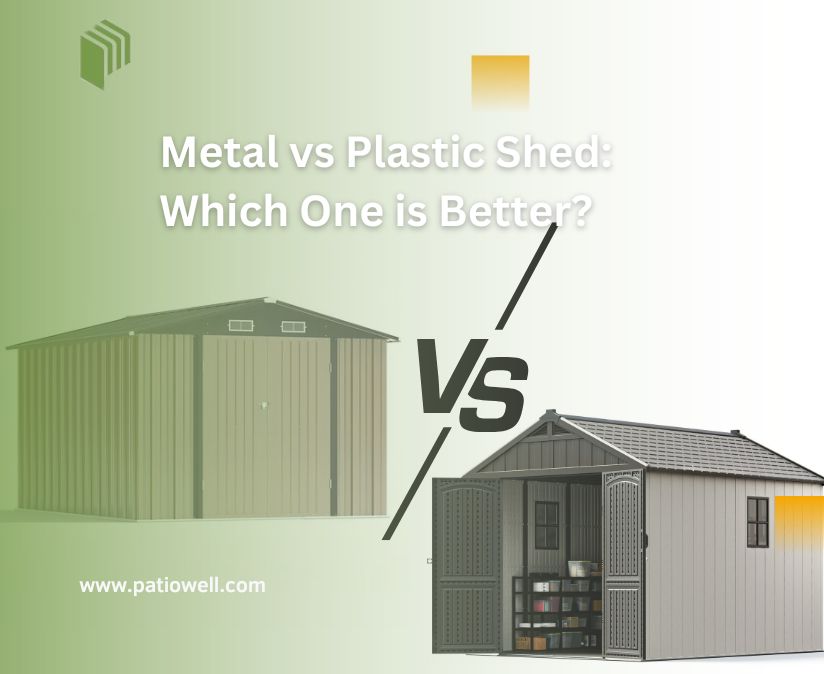
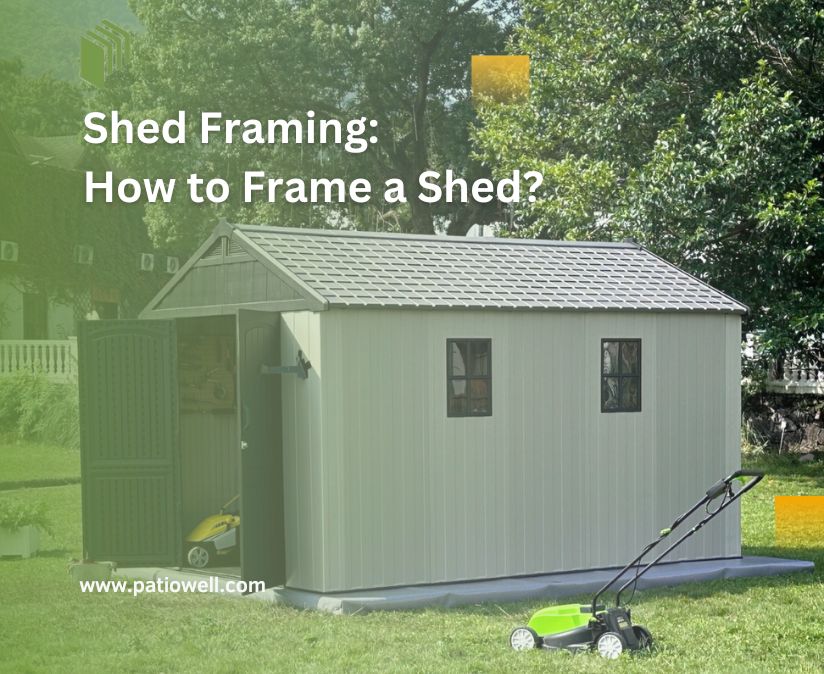
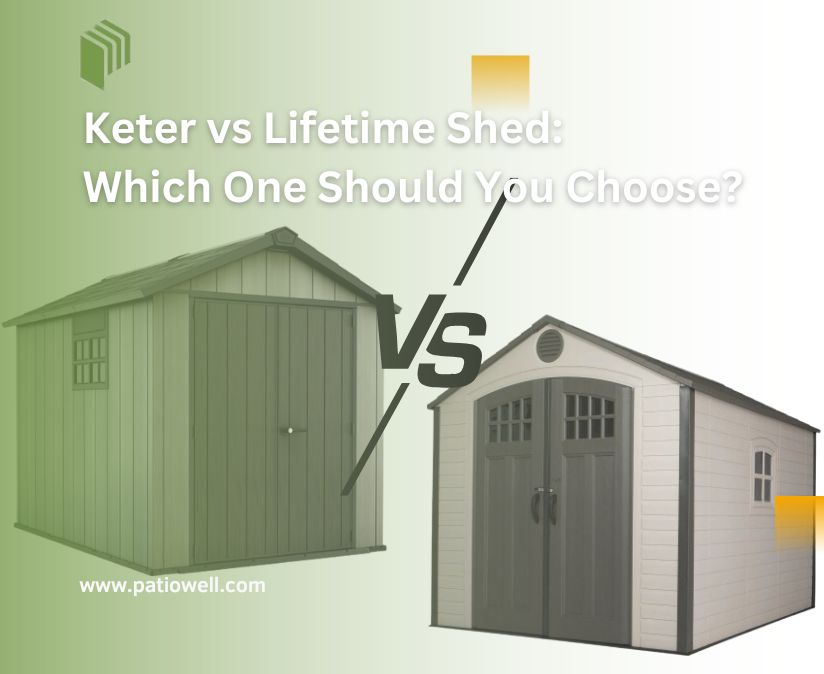
Leave a comment
All comments are moderated before being published.
This site is protected by hCaptcha and the hCaptcha Privacy Policy and Terms of Service apply.